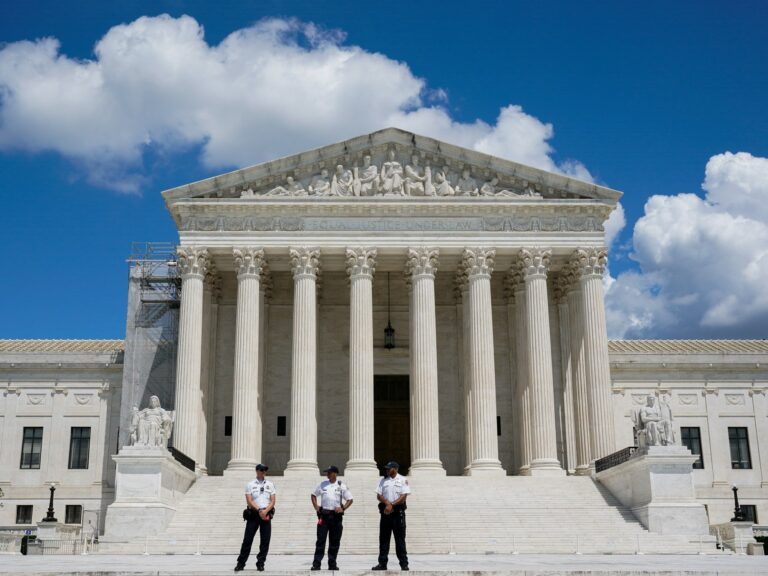The Supreme Court overturned a 40-year-old decision that made it easier for the federal government to regulate the environment, public health, workplace safety and consumer protection, delivering a far-reaching and potentially beneficial victory for corporate interests.
The Supreme Court’s six conservative justices on Friday overturned the 1984 decision known as Chevron, which has long been a target of conservatives. The liberal justices dissented.
Potential litigation resulting from the Supreme Court’s decision could cost billions of dollars, and President Joe Biden’s administration’s top Supreme Court lawyer has warned that such a move would be an “undue shock to the judicial system.”
The core of the Chevron decision is that federal agencies should be allowed to fill in the details when the law isn’t clear. Critics of the decision argued that it gives government experts powers that should be exercised by judges.
“Courts must exercise their own discretion in determining whether a government agency acted within its statutory authority,” Chief Justice John Roberts wrote for the court.
Roberts wrote that the ruling does not call into question past precedent based on the Chevron decision.
But Justice Elena Kagan wrote in her dissent that this assurance was hollow. “While the majority is optimistic, I am not,” she wrote.
Kagan called the decision “another example of the Supreme Court’s determination to curtail agency power, despite Congress’s directive to the contrary.”
The court ruled in a lawsuit brought by Atlantic herring fishermen from New Jersey and Rhode Island who challenged the fee requirement.
Lower courts used the Chevron decision to uphold a 2020 National Marine Fisheries Service rule that requires herring fishermen to pay government-appointed monitors to track their fish intake.
Conservatives and business leaders strongly supported the fishermen’s appeal, betting that the Supreme Court, reshuffled during Republican President Donald Trump’s term, would deal another blow to the regulatory state.
The court’s conservative majority has previously reined in environmental regulations and blocked the Democratic Biden administration’s efforts on COVID-19 vaccines and student loan forgiveness.
Chevron’s decision
The Supreme Court has not used the Chevron decision since 2016, but lower courts continue to do so.
Forty years ago, in a case brought by environmental groups challenging the Reagan administration’s deregulation of power plants and factories, the Supreme Court, in a 6-0 vote, with three justices overruling, ruled that judges should play a limited, deferential role in evaluating the actions of government experts.
“Judges are not experts in their fields and are not members of either political branch of government,” Justice John Paul Stevens wrote in 1984, explaining why judges’ roles are limited.
But the current 6-3 conservative-majority Supreme Court has grown increasingly skeptical of federal agency power, with Justices Samuel Alito, Neil Gorsuch, Brett Kavanaugh and Clarence Thomas all questioning the Chevron decision.
They, along with Justice Amy Coney Barrett, formed the majority on Friday.
Justices Ketanji Brown Jackson and Sonia Sotomayor joined Justice Kagan in dissent.

Opponents of the Chevron doctrine have argued that judges apply it too far to decisions approved by government officials. The court on Friday adopted their argument, saying judges must use their authority and judgment to determine what the law is.
Bill Bright, a fisherman from Cape May, New Jersey, who joined the lawsuit, said the decision to overturn Chevron’s ruling would help fishing livelihoods. “Nothing is more important than protecting the livelihoods of our families and crew,” Bright said in a statement.
“Convulsive shock”
President Biden’s administration defended the ruling in favor of the fees, saying overturning the Chevron decision would send a “shock” through the justice system.
Environmental and health advocates, civil rights groups, labor unions and national and state Democrats had urged the court to let the Chevron ruling stand.
“The Supreme Court is taking power away from elected agencies to advance its deregulatory agenda and propelling the country into uncharted territory,” Sambhav Sankar, a lawyer for the environmental group Earthjustice, said after the ruling. “The conservative justices are actively reshaping the fabric of our government to weaken the president and Congress’ ability to protect the public and give corporations more power to challenge regulations for their own profits. This decision threatens the legitimacy of hundreds of regulations that keep us safe, protect our homes and environment, and level the playing field for companies to compete.”
Among the industry groups that supported the fishermen were gun, e-cigarette, agriculture, timber and homebuilding groups, as well as conservative groups that have intervened in recent high court cases to limit regulations on air and water pollution.
Fishermen filed suit challenging the 2020 regulations that would have authorized fees of more than $700 a day, even though no one had to pay them.
In lawsuits filed in New Jersey and Rhode Island, the fishermen argued that Congress never gave federal regulators the authority to charge fishermen for the monitoring devices. They lost, although lower courts upheld the regulations, citing the Chevron decision.
With Jackson removed from the New Jersey case, the justices heard two cases on the same issue – one that he previously intervened in when he was an appeals court judge – and one in which the entire Rhode Island court joined.

